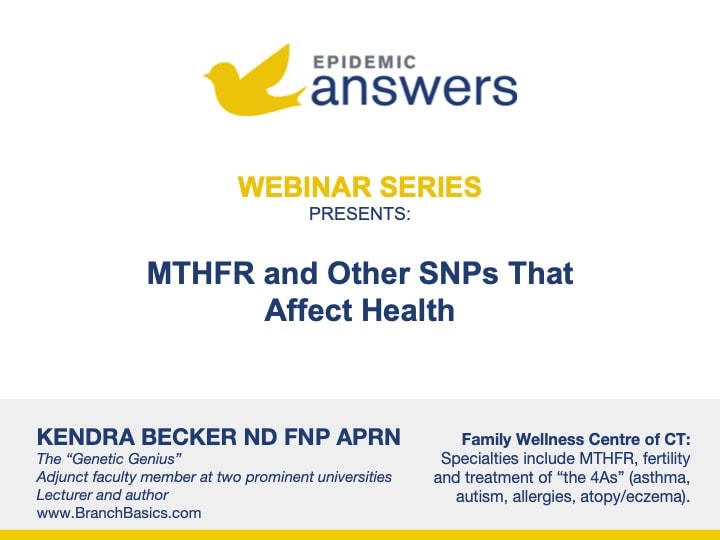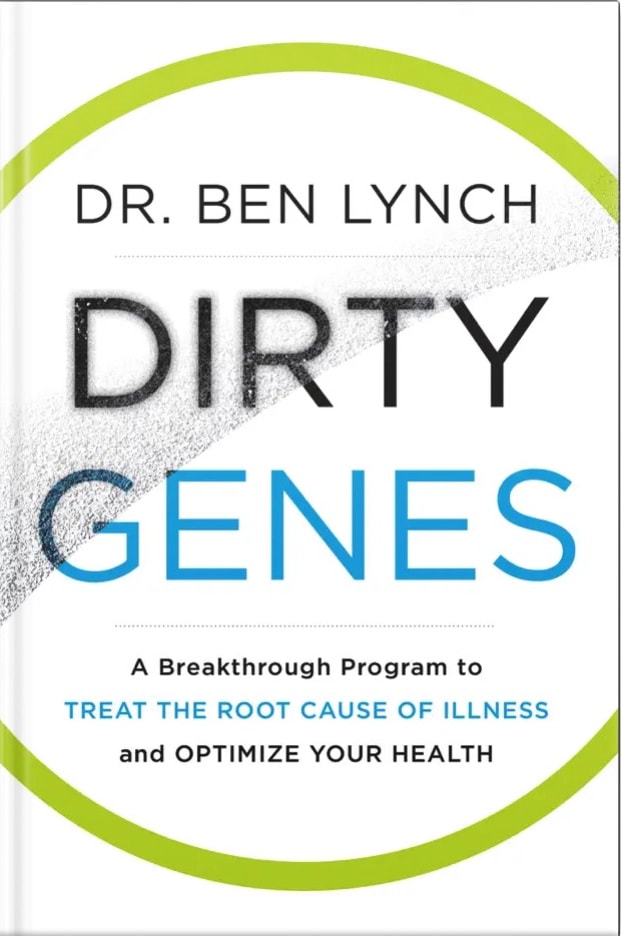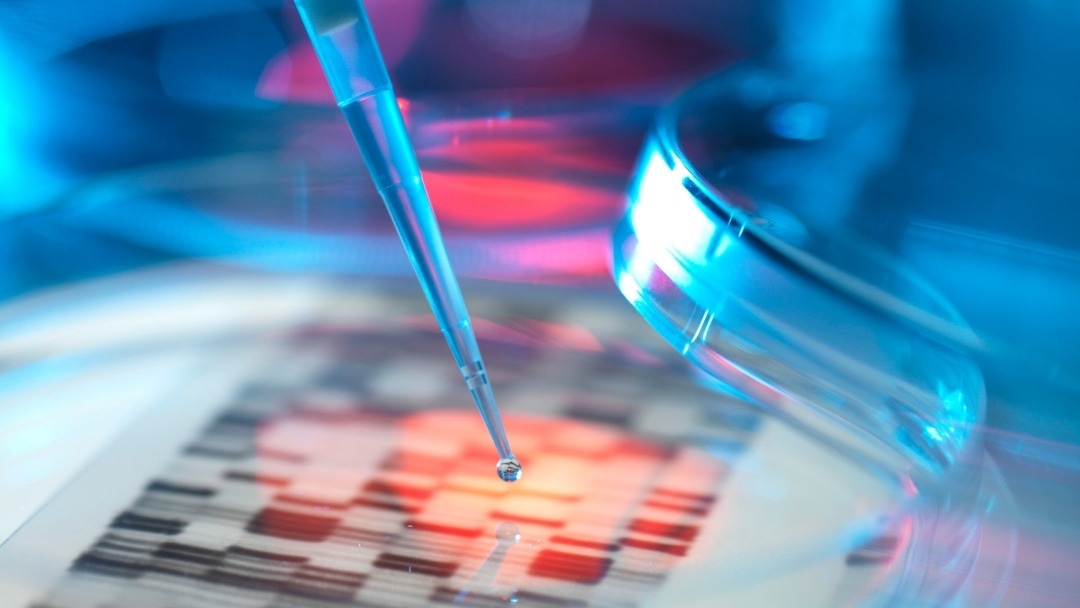We interviewed Heather Way PhD, the director of TACGA (The Australian Centre for Genomic Analysis), about nutritional genomics for autism, ADHD and SPD. You can watch the replay below.
What Is Neurodevelopmental Genomics?
Neurodevelopmental genomics is a powerful tool for developing personalized, potential intervention strategies for improving outcomes in children with neurodevelopmental disorders such as autism spectrum disorders (ASD), ADHD and Sensory Processing Disorder (SPD) as well as PANS/PANDAS, based on each child’s bioindividual genetic makeup.
Differences in a child’s genes are due not only to genes inherited from each parent but also from epigenetic changes to genes from environmental, lifestyle and nutritional influences. These external factors can affect a gene’s expression.
In This Webinar
In this webinar, Dr. Way explained how understanding how a person’s individual genes are functioning can be used to develop actionable and targeted interventions. In her work, she analyzes about 700 potential genetic mutations in DNA and combines it with analysis of a person’s unique microbiome.
Case studies were shared to support this strategy showing how these targeted interventions improved symptoms of ASD, ADHD and SPD significantly.
Dr. Way helped us understand:
- Does our genetic inheritance equal our health destiny?
- Is there anything that can be done to change the expression of genes?
- Which genes are responsible for these disorders?
- When is the best time in the healing journey to test for health-related genes?
- Are adults too old to be addressed with this approach?
- What are some success stories of children who have used this approach?
You can find a PDF of Dr. Way’s presentation here.
Please note that you will be asked to provide your email address at the 30-minute mark to continue viewing the replay.
About Heather Way PhD
Dr. Heather Way is the director of TACGA (The Australian Centre for Genomic Analysis). Dr. Way holds a PhD in Molecular Pathology and is an expert in the field of Autism Nutrigenomics and Microbiome sequencing.
Dr. Way specializes in recovering children on the autism spectrum who have had neurological and/or immunological insults.
She has published numerous peer-reviewed medical research articles including Genomics as a Clinical Decision Support Tool: Successful Proof of Concept for Improved ASD Outcomes as well as Utilizing Genomically Targeted Molecular Data to Improve Patient-Specific Outcomes in Autism Spectrum Disorder.

Nutrigenomics enables genetic predispositions to be understood and managed via epigenetics and nutrition.
Dr. Way also has two teenagers who were on the spectrum and fully recovered using her protocol.
Dr. Way’s team produce personalized programs for ASD / ADHD clients all over the world. Interventions are tailored according to specialist neurodevelopmental DNA profiles and specialized ASD microbiome sequencing profiles, both of which Dr. Way helped develop, together with a fussy-eating program. The TACGA team’s high success rate is due to this integrated, personalized approach.
Disclaimer
This webinar is not a substitute for medical advice, treatment, diagnosis, or consultation with a medical professional. It is intended for general informational purposes only and should not be relied on to make determinations related to treatment of a medical condition. Epidemic Answers has not verified and does not guaranty the accuracy of the information provided in this webinar.
Still Looking for Answers?
Visit the Epidemic Answers Practitioner Directory to find a practitioner near you.
Join us inside our online membership community for parents, Healing Together, where you’ll find even more healing resources, expert guidance, and a community to support you every step of your child’s healing journey.
Sources & References
Arnold, P.A., et al. Glutamate transporter gene SLC1A1 associated with obsessive-compulsive disorder. Arch Gen Psychiatry. 2006 Jul;63(7):769-76.
Ashwood, P., et al. Associations of impaired behaviors with elevated plasma chemokines in autism spectrum disorders. J Neuroimmunol. 2011 Mar;232(1-2):196-9.
Bidwell, L.C., et al. Genetic influences on ADHD symptom dimensions: Examination of a priori candidates, gene-based tests, genome-wide variation, and SNP heritability. Am J Med Genet B Neuropsychiatr Genet. 2017 Jun;174(4):458-466.
Binder, D.K., et al. Brain-derived neurotrophic factor. Growth Factors. 2004 Sep;22(3):123-31.
Bowers, K., et al. Glutathione pathway gene variation and risk of autism spectrum disorders. J Neurodev Disord. 2011 Jun;3(2):132-43.
Esmaiel, N.N., et al. The potential impact of COMT gene variants on dopamine regulation and phenotypic traits of ASD patients. Behav Brain Res. 2020 Jan 27;378:112272.
Grimaldi, R., et al. A prebiotic intervention study in children with autism spectrum disorders (ASDs). Microbiome. 2018 Aug 2;6(1):133.
Guilford, T., et al. Deficient Glutathione in the Pathophysiology of Mycotoxin-Related Illness. Toxins (Basel). 2014 Feb 10;6(2):608-23.
Hausman-Cohen, S., et al. Utilizing Genomically Targeted Molecular Data to Improve Patient-Specific Outcomes in Autism Spectrum Disorder. Int J Mol Sci. 2022 Feb 16;23(4):2167.
Hausman-Cohen, S.R., et al. Genomics of Detoxification: How Genomics can be Used for Targeting Potential Intervention and Prevention Strategies Including Nutrition for Environmentally Acquired Illness. J Am Coll Nutr. 2020 Feb;39(2):94-102.
Hwang, I.W., et al. Association of Monoamine Oxidase A (MAOA) Gene uVNTR and rs6323 Polymorphisms with Attention Deficit and Hyperactivity Disorder in Korean Children. Medicina (Kaunas). 2018 May 18;54(3):32.
Kordulewska, N.K., et al. Serum cytokine levels in children with spectrum autism disorder: Differences in pro- and anti-inflammatory balance. J Neuroimmunol. 2019 Dec 15;337:577066.
Lee, K., et al. Autism-associated Shank3 mutations alter mGluR expression and mGluR-dependent but not NMDA receptor-dependent long-term depression. Synapse. 2019 Aug;73(8):e22097.
Li, Y., et al. Association between MTHFR C677T/A1298C and susceptibility to autism spectrum disorders: a meta-analysis. BMC Pediatrics. 2020(20)449.
Meng, X., et al. Association between MTHFR (677C>T and 1298A>C) polymorphisms and psychiatric disorder: A meta-analysis. PLoS One. 2022 Jul 14;17(7):e0271170.
Mold, M., et al. Aluminium in brain tissue in autism. J Trace Elem Med Biol. 2018 Mar;46:76-82.
Rahbar, M.H., et al. Detoxification Role of Metabolic Glutathione S-Transferase (GST) Genes in Blood Lead Concentrations of Jamaican Children with and without Autism Spectrum Disorder. Genes (Basel). 2022 May 29;13(6):975.
Sadeghiyeh. T., et al. Association of MTHFR 677C > T and 1298A > C polymorphisms with susceptibility to attention deficit and hyperactivity disorder. Fetal Pediatr Pathol. 2020 Oct;39(5):422-429.
Sakurai, T., et al. Slc25a12 disruption alters myelination and neurofilaments: a model for a hypomyelination syndrome and childhood neurodevelopmental disorders. Biol Psychiatry. 2010 May 1;67(9):887-94.
Skripuletz, T., et al. The choline pathway as a strategy to promote central nervous system (CNS) remyelination. Neural Regen Res. 2015 Sep;10(9):1369-70.
Tomljenovic, L., et al. Do aluminum adjuvants contribute to the rising prevalence of autism? J Inorg Biochem. 2011 Nov;105(11):1489-99.
Way, H., et al. Genomics as a Clinical Decision Support Tool: Successful Proof of Concept for Improved ASD Outcomes. J Pers Med. 2021 Jun 24;11(7):596.
Wilson, S., et al. Role of the NLRP3 Inflammasome in Responses. J Allergy Clin Immunol. 2012 Feb 1; 129(2):Supplement AB162.
Resources
Books
Lynch, Ben. Dirty Genes: A Breakthrough Program to Treat the Root Cause of Illness and Optimize Your Health. HarperOne, 2020.
Walsh, William J. Nutrient Power: Heal Your Biochemistry and Heal Your Brain. SkyHorse, 2014.
Yasko, Amy. Feel Good Nutrigenomics. Neurological Research Institute, 2014.



